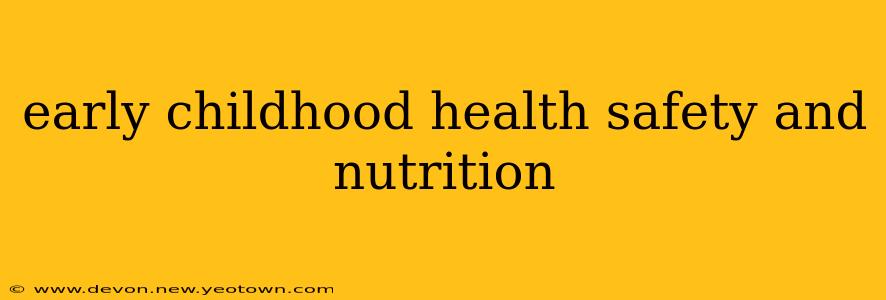The journey of parenthood is a beautiful adventure, filled with joy, wonder, and, let's be honest, a healthy dose of worry. Ensuring the health, safety, and nutrition of your little ones is paramount. This isn't just about preventing illness; it's about laying the foundation for a lifetime of well-being. This guide will walk you through essential aspects of early childhood development, addressing common concerns and offering practical advice.
What are the most important aspects of early childhood health?
This is a broad question, but the answer boils down to a few key pillars: physical health, mental health, and developmental milestones. Regular checkups with your pediatrician are crucial. These visits allow for monitoring of growth, vaccinations, and early detection of any potential health issues. Beyond the clinical, fostering a healthy lifestyle through proper nutrition, sufficient sleep, and regular physical activity is essential. And let's not forget the importance of nurturing their emotional well-being through love, security, and positive interactions.
What are some common health problems in early childhood?
Early childhood is a period of rapid growth and development, making little ones susceptible to various ailments. Common health problems include ear infections, respiratory illnesses (like colds and the flu), and gastrointestinal issues. Allergies, such as eczema and food allergies, are also relatively common. Prompt medical attention is crucial for any concerning symptoms. Prevention, through good hygiene practices like handwashing and vaccination, plays a significant role in mitigating these risks.
How can I ensure my child's nutritional needs are met?
Nutrition is the cornerstone of healthy development. Focus on offering a balanced diet rich in fruits, vegetables, whole grains, and lean proteins. Limit sugary drinks and processed foods. Portion sizes should be age-appropriate, and remember that picky eating is common. Instead of forcing foods, offer a variety of options and be patient. Don't hesitate to consult a pediatrician or registered dietitian if you have concerns about your child's eating habits or nutritional status. Remember, healthy eating habits established early can positively influence their health throughout life.
What are some important safety precautions for young children?
Keeping your child safe requires constant vigilance. Childproofing your home is the first step. Secure cabinets, cover electrical outlets, and install safety gates. Never leave your child unattended near water, and always supervise them around stairs and other potential hazards. Car seat safety is paramount. Ensure your child is properly restrained in an age-appropriate car seat, following the manufacturer's instructions carefully. Teach your child about stranger danger and basic safety rules as they grow older. Remember, proactive safety measures provide a secure environment for your child to explore and learn.
What are the best ways to promote healthy sleep habits in young children?
Adequate sleep is vital for physical and cognitive development. Establish a consistent bedtime routine to signal to your child that it's time to wind down. Create a calm and dark sleep environment. Ensure your child gets enough sleep according to their age; consult your pediatrician for age-appropriate sleep guidelines. A well-rested child is a happier and healthier child.
How can I identify developmental delays in my child?
Every child develops at their own pace, but monitoring developmental milestones is essential. If you notice significant delays in areas like speech, motor skills, or social interaction, consult your pediatrician. Early intervention is key in addressing developmental delays. Regular check-ups, developmental screenings, and open communication with your pediatrician will help you track your child's progress and identify any potential concerns early.
What are the signs of child abuse and neglect?
Recognizing the signs of child abuse and neglect is crucial for protecting children. These signs can be physical (unexplained bruises, burns, or injuries), behavioral (sudden changes in behavior, withdrawal, or aggression), or emotional (excessive fear, anxiety, or depression). If you suspect child abuse or neglect, report it to the appropriate authorities immediately. Your intervention could save a child's life.
This guide provides a foundation for supporting the health, safety, and nutrition of your child. Remember, every child is unique. Trust your instincts, stay informed, and build a strong relationship with your pediatrician – they're your invaluable partner in this journey.

